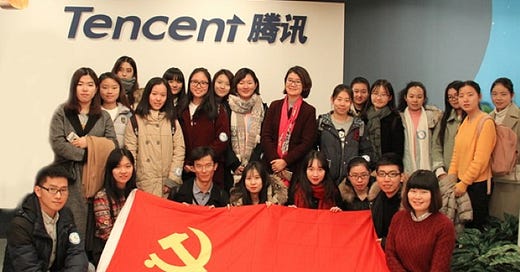China widens big tech crackdown
Exec resignations, company breakups, new regs mark new priorities for Beijing
Enjoy this special edition of Contention — you can read it in under five minutes. If you like it, please take a moment to share it with folks who will probably like it too!
Days after the closing of China’s “two sessions,” the country’s annual legislative meeting, Beijing is widening a regulatory storm enveloping most of the country’s tech giants. If the effort works, it could reduce systemic risk in China’s increasingly consumer-driven economy, while knocking a few tech billionaires down a peg.
How this process develops and its final results will shape the trajectory of the Chinese economy and the role of its governing Communist Party for years to come.
On Monday, China’s regulators ordered the country’s largest non-state-owned company, Alibaba, to jettison its ownership of all its media assets. The ecommerce giant’s properties include substantial shares in the video-sharing site Bilibili and Weibo, a Twitter-like social media site, as well as shares in broadcast, print media, and advertising companies.
The clampdown follows last year’s publication of new antitrust regulations, and the government’s halting of fintech company (and Alibaba affiliate) Ant Group’s $35 billion initial public offering -- what would’ve been the largest ever.
Ant Group CEO Simon Hu resigned on Friday. Hu cited “personal reasons” for the move, but his timing suggests it may be part of the Communist Party’s new scrutiny on the tech sector.
In another sign of the widening crackdown, Chinese Pres. Xi Jinping said during a Monday meeting of the Communist Party’s Central Committee for Financial and Economic Affairs that a top priority for the country is to “establish and improve the platform economy governance system” so it will be “regulated, healthy and sustainable.”
In China, the “platform economy” encompasses large tech firms like Alibaba and main rival Tencent, alongside others such as ride-sharing giant Didi Chuxing and food-delivery company Meituan.
Giant firms steamrolling the competition with algorithmic ruthlessness is out, “equal importance to development and regulation” is in. Anti-competitive practices such as Alibaba punishing merchants who sell goods on rival platforms and undercutting competition with loss-leading promotions risk drawing new, and more intense scrutiny. To encourage innovation and further growth, the party should “fight monopoly and prevent the disorderly expansion of capital.”
China’s regulators are also turning their sights on Tencent, one of the country’s largest tech conglomerates with holdings in gaming, digital payments and WeChat. Tencent saw $62 billion in market value wiped out in recent days as its stock fell in fear of new regulatory pressure.
“All else equal, we think it could be argued that Tencent’s fintech business is now valued at almost zero,” Bernstein Research analysts wrote on Friday.
The scrutiny has even extended to online grocer Pinduoduo, which serves around 730 million customers. On Wednesday, chairman and founder Colin Huang relinquished control, resigning soon after regulators fined the company over improper pricing practices which “disrupted market order.” Beijing also launched an investigation into working conditions at Pinduoduo after the deaths of two employees which drew criticism to the tough “996” working schedule shared by many of China’s megafirms: 9 a.m. to 9 p.m., six days a week.
Why is the party pursuing this campaign with its wave of breakups, executive resignations, and sweeping new regulations now? Because China’s new “dual circulation” development strategy depends on consumer strength, and Beijing fears that predatory business practices and runaway financial risks from megacorporate financial shenanigans could undermine the plan.
If, on the other hand, it can pull the strategy off, China will move further away from any dependence on Western capital. The country’s system makes it clear that all its “unicorns” and other businesses are subject to the political authority of the Communist Party. Recent events have underscored that fact.
For instance, new rules drawn up in recent months by China’s State Administration for Market Regulation now require firms to seek official approval for mergers and acquisitions involving Variable Interest Entities (VIEs).
VIEs are a shell structure developed to circumvent Chinese law, allowing companies officially restricted from selling shares to overseas investors, such as internet companies, to sell equity to foreigners. VIE’s have been a way for early Chinese capital to move out of China, avoiding taxes and the country’s financial controls.
China has never claimed that its system is perfect, but it does have very clear strategic priorities set outside of corporate boardrooms. In a previous era when rapid growth was the highest priority, regulation stalled and monopolies boomed. Now that the country has eliminated absolute poverty and laid the foundation for high quality development, the party has made trimming those excesses its new priority.
There is certain to be pushback and stumbles along the way. But if the country succeeds, it will reflect a type of growth the world has not seen before.
Disclaimer
Our only investment advice: The next six months will be critical.
Contact us with questions, feedback, or stories we might have missed.




